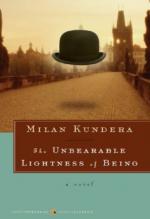|
This section contains 6,635 words (approx. 23 pages at 300 words per page) |

|
SOURCE: “Eternal Return and The Unbearable Lightness of Being,” in Review of Contemporary Fiction, Vol. 9, No. 2, Summer, 1989, pp. 65-78.
In the following essay, von Morstein examines Kundera's interpretation of existential experience and Nietzsche's philosophical concept of “eternal return” in The Unbearable Lightness of Being.
Kundera's The Unbearable Lightness of Being begins with a reflection on Nietzsche's idea of “eternal return.” This idea does not represent an objective worldview which could be established by dispassionate scientific investigation. Yet Nietzsche claims that eternal return is the most scientific of all theories. He means that the idea of eternal return provides comprehension of what it is to be. It expresses existential awareness, what it feels like to be human. Traditional science, by contrast, abstracts from the existential aspect of the human condition. Eternal return is a “theory” through which the existential human situation is shown but not explained or described.
Kundera's...
|
This section contains 6,635 words (approx. 23 pages at 300 words per page) |

|


